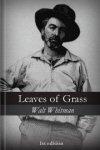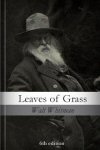Leaves of Grass (2 vols.)
Digital Logos Edition
This product has been transferred from Community Pricing to Pre-Pub. The actual funding level may be lower than it appears, which could delay production. The amount of funding still needed will be evaluated and updated soon.
Overview
Experience the energy and intrigue of Walt Whitman’s pioneering work, Leaves of Grass—widely regarded as the keystone work of a distinctly American poetry. Released in several iterations from 1855 to 1892, the small collection of poems grew from 12 to over 400. This collection pairs the anonymously published 1st edition—complete with Whitman’s original preface and some contemporary critical responses—with the last fully redesigned edition of 1881, providing a poetic picture of the great American poet in both his vigorous youth and increasingly contemplative old age.
Instead of exalting only the material or metaphysical, celebrating one at the expense of the other, Whitman embraced both the physical and spiritual pieces of humanity. His poetic voice is simultaneously gritty and ethereal. A pioneer in free verse, his influence is apparent in the work of Allen Ginsberg, Jack Kerouac, William Carlos Williams, D.H. Lawrence, and countless other writers.
The Logos edition of Leaves of Grass is enhanced by amazing functionality. You can study Whitman’s text alongside a library of classic literature and philosophy. Important terms link to dictionaries, encyclopedias, and a wealth of other resources in your digital library. Powerful searches help you find exactly what you’re looking for. Tablet and mobile apps let you take your study with you. With Logos Bible Software, the most efficient and comprehensive research tools are in one place, so you get the most out of your study.
Key Features
- Includes the 1st and 6th editions of Leaves of Grass
- Presents one of the most important American literary works of the nineteenth century.
- Provides Walt Whitman’s original preface and contemporary critical responses
Praise for Walt Whitman
Whitman’s best poems have that permanent quality of being freshly painted, of not being dulled by the varnish of the years. Reading them a century after their publication, one feels the same shock and wonder and delight that Emerson felt when opening his presentation copy of the first edition. They carry us into a new world that Whitman discovered as if this very morning. . . . After reading all of Leaves of Grass as Whitman wished it to be preserved and after being won over by what I think is the best of it . . . I am willing to join the consensus that regards him as our most rewarding poet.
—Malcolm Cowley, literary critic, author, Blue Juniata
If you are American, then Walt Whitman is your imaginative father and mother, even if, like myself, you have never composed a line of verse. You can nominate a fair number of literary works as candidates for the secular Scripture of the United States. . . . None of those . . . are as central as the first edition of Leaves of Grass.
—Harold Bloom, literary critic, author, The Western Canon
Whitman, the one pioneer. And only Whitman. No English pioneers, no French. No European pioneer-poets. In Europe the would-be pioneers are mere innovators. The same in America. Ahead of Whitman, nothing.
—D.H. Lawrence, author, Lady Chatterly’s Lover
Whitman is to my fatherland what Dante is to Italy.
—Ezra Pound, poet, literary critic
Walt Whitman was the protagonist of a truly geographical personality: The first man in history to speak with a truly continental American voice, to bear a truly American name.
—Pablo Neruda, winner, Nobel Prize for Literature
Product Details
- Title: Leaves of Grass
- Author: Walt Whitman
- Volumes: 2
- Pages: 502
Individual Titles

This volume contains the first edition of Leaves of Grass, published in 1855. In addition to the 12 original poems, it contains Walt Whitman’s preface and several contemporary critical responses.
Contents:
- Whitman’s Preface
- Song of Myself
- A Song for Occupations
- To Think of Time
- The Sleepers
- I Sing the Body Electric
- Faces
- Song of the Answerer
- Europe: The 72nd and 73rd Years of These States
- A Boston Ballad
- There Was a Child Went Forth
- Who Learns My Lesson Complete?
- Great Are the Myths

This volume contains the 1881 edition of Leaves of Grass. This sixth edition is a definitive publication of Leaves of Grass, being the last completely redesigned edition. It contains more than 400 individual poems.
Contents:
- Inscriptions
- Starting from Paumanok
- Children of Adama
- Calamus
- Salut au Monde
- Song of the Open Road
- Crossing Brooklyn Ferry
- Song of the Answerer
- Our Old Feuillage
- A Song of Joys
- Song of the Broad-Axe
- Song of the Exposition
- Song of the Redwood-Tree
- A Song for Occupations
- A Song of the Rolling Earth
- Youth, Day, Old Age, and Night
- Birds of Passage
- A Broadway Pageant
- Sea-Drift
- By the Roadside
- Drum-Taps
- Memories of President Lincoln
- By Blue Ontario’s Shore
- Reversals
- Atumn Rivulets
- Proud Music of the Storm
- Passage to India
- Prayer of Columbus
- The Sleepers
- Transpositions
- To Think of Time
- Whispers of Heavenly Death
- Thou Mother with Thy Equal Brood
- A Paumanok Picture
- From Noon to Starry Night
- Songs of Parting
About Walt Whitman
Walt Whitman (1819–1892) was an American poet, essayist, and journalist. Writing in the space between transcendentalism and realism, Whitman is regarded as America’s preeminent nineteenth-century literary figure and the father of free verse. He was born on Long Island and worked as a journalist, teacher, and clerk. He also served as a nurse in the Civil War. His poetry generated significant controversy in his day, though subsequent generations have received his work with near universal acclaim.